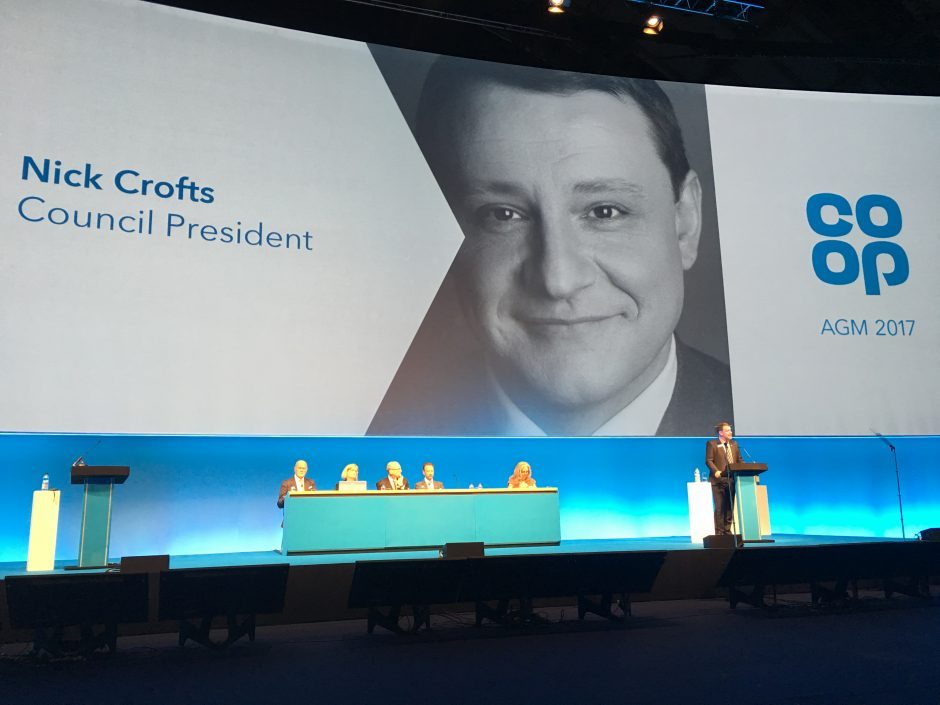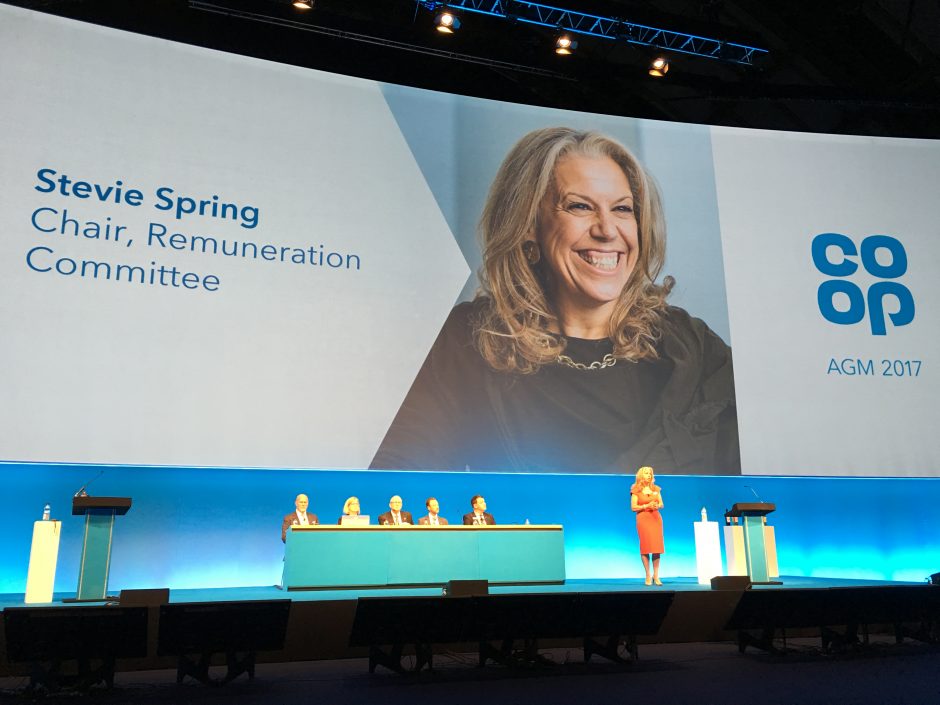In opening his first annual meeting as chief executive, Steve Murrells said the Co-op Group has made membership meaningful again.
“Last year we announced that our Co-op was back to being Co-op. We are back to putting our members and communities first. It’s important to understand that we’re strong again. We brought back an iconic look from our past last year, but the change in our new-look was not just a high street makeover, we’ve done this to bring attention to our membership awards,” said Mr Murrells.
The membership scheme gives 5% back to members on own-brand products, and 1% to local causes. Said Mr Murrells: “By yesterday we have given back £37m to our members. But, let’s look at the 1% more closely, we’ve given back more than £9m to every cause. That’s more than £2,000 to each local cause. In speaking to one person who has received money this way, they told me that this amount is the difference in keeping it going or closing it. We’ve made membership meaningful again.”
In looking at the Group’s charity work, Mr Murrells announced: “We have raised a staggering £6m for the British Red Cross. This is never just about raising money, we’re here for the long-term. We’re going to use the £6m to recruit community connectors, helping thousands of people reconnect. Tackling loneliness is what we want to be known for. “
In addition, Mr Murrells said it has launched ‘community recovery vehicles’, which responds to natural disasters in communities. The next time a flooding happens,” he said, “we’ll be there in our truck with our food business, insurance assessor and if needed legal advisors.”
Looking ahead to the future, Mr Murrells said that now that businesses are profitable, it’s not just about fixing the basics anymore. He added: “In Funeralcare we’re operating an entirely new operating mode so that we’re a leader in innovation and client care. We must make our insurance products better for members. In food, we’re transforming logistics and operations to make your shopping trip better.”
He also added that there are cost challenges due to rising inflation and the potential impact of Brexit.
On his long-term vision, he said: “I have longer-term ambitions. I want to encourage young people to shop with for us. I want our Co-op to be a great place to work that celebrates the diversity. I want to find new ways to create co-op value for you, our members. I want us to show leadership in the movement and around the world. We are here to make things better for our members and communities. Together we can create a strong and much-loved co-op.”

Nick Crofts, president of the members’ council, has praised the collective knowledge of council members, who have more than 1,000 years of membership experience.
“This has been a year of growth and progress as we continue to rebuild and invest in the future,” he said. “The council has offered a robust challenge, setting a new benchmark for how members can make decisions.”
To strengthen membership, Mr Crofts announced that the board has agreed to recruit 1,500 Member Pioneers. The Pioneers make connections in the communities around food stores and funeral branches. They do this by arranging local meetings and events to encourage volunteering in local communities.
Author and broadcaster Lemn Sissay has been recruited as a member pioneer ambassador. He said: “The nature of the co-operative is a family, with all the arguments, resolution and making up. I was getting emotional when I was hearing the chief executive speak. You have to feel it. It has to come from inside your heart. I believe in the nature of the co-operative. I’m really honoured to be here today to listen to everything that’s been said.”
As a democratic organisation, Mr Crofts said the Co-op is looking at ways to involve members: “Members must have more opportunities to shape and take part in the Co-op they own. We are looking at new ways for members to get involved, such as choosing the name of our Pioneer wine and writing tasting notes to real brand ales.”
He added: “We are part of a great movement that is bigger than our co-op. We know our model can deliver a fairer, more sustainable and equal society. We can make difference to the lives of millions of people.”

Stevie Spring, director and chair of the remuneration committee, provided an overview of the Group’s pay policies over the past year.
“Executive pay is still very much in the headlines,” said Ms Spring, “especially in what has become the growing gap between the highest and lowest paid. We’re a co-op, we do things differently. We are not bound by the same rules. We want to restore trust and show ethical responsibility. Our approach to pay has changed. We made some changes last year and we’ll be making more. We need to ensure our policy is fit for purpose. We want to do that for all colleagues. We want to compete for talent in the wider world, but while reflecting on our values and principles.”
Ms Spring said there was no executive pay increase in the last year, but major changes we made to their packages, which included a reduction in pension contributions from 40% to 10% and people who replaced executives did not take their pay.
She said: “I want our policy and philosophy of award to be clear, aligned to values, executives shouldn’t be the highest paid in the market, we shouldn’t abuse their goodwill and dedication to co-operation either.”
On staff in stores, Ms Spring said workers have received an equivalent rise of 10.5% and that it pays above the £7.50 minimum wage. It also pays the same rate for all staff members, regardless of their age or whether they are an apprentice.
She also said, the Group is looking at how it can pay the Living Wage Foundation’s rate of £8.45 (and £9.75 in London). “We’d love to be the first retailer to do that,” she said. “But we have to be realistic. By raising pay to that level we’d need to find another £45m for each of the next three years. It’s hugely ambitious in a cutthroat market. It’s a big hairy audacious goal, but we want to find a way to get there.”
Looking ahead, Ms Spring said it is conducting a full review of how the Group rewards executives and it will begin reporting on pay by gender in 2018.
The motions
Following the opening speeches, members voted on a number of motions. Here is how they voted:
Motion 1: Members voted on the Annual Report and Accounts for the year ended 31 December 2016.
The report. released in April, reported £132m loss after the value of its shareholding in the Co-op Bank was written down to nil. An underlying profit before tax of £59m (2015: £81m) was down, due to increased rebuild investment, and there was no dividend. The report hailed an “exceptional year” which showed the successful progress of the rebuild process.
Members voted to accept the motion with 98% of the votes
Motion 2: Members voted to approve the Directors’ Remuneration Report for the year ended 31 December 2016.
Outgoing chief executive Richard Pennycook received a total of £2,373,000; his successor Steve Murrells, formerly chief executive of Co-op Food, received £1,836,000; Rod Bulmer, CEO of consumer services, received £1,503,000; general counsel Alistair Asher made £1,275,000; chief finance officer Ian Ellis made £1,197,000; deputy CEO Pippa Wicks made £841,000; chief digital officer Mike Bracken made £628,000; HR chief Sam Walker made £482,000; Group secretary Helen Grantham made £327,000; and chief membership officer Rufus Olins made £94,000.
Members voted to accept the motion by 93% of the vote
Motion 3: Members voted to authorise the Remuneration Committee to simplify executive pay by adjusting the balance and design of the annual and long-term incentives provided the total quantum that can be received for annual and long-term incentives does not exceed the current amount.
Members voted to accept the motion by 94% of the vote
Motion 4: Election Steve Murrells as an executive director.
Mr Murrells, who joined the Group as CEO of Co-op Food in 2012, was appointed CEO of the Group on 1 March after the departure of Richard Pennycook. In his pre-election statement he said: “As we transition from Rebuild to Renew, our Co-op has a vision to be as radical as it was in 1844 and I want us to make the most of that opportunity.”
Members voted to accept the motion by 96% of the vote
Motion 5: Members voted to re-elect Allan Leighton as an Independent Non-Executive Director.
Mr Leighton was appointed as an independent non-executive director and chair in February 2015.In his pre-election statement he said: “Inspiring young people to make the most of their lives is something that means a lot to me and I will again donate my fee as a director and chair to the Co-op Foundation which does some fantastic work helping the young make a positive contribution to our communities.”
Members voted to accept the motion by 95% of the vote
Motion 6: Members voted to re-elect Sir Christopher Kelly as an Independent Non-Executive Director.
Sir Christopher was apppointed independent non-executive director and senior independent non-executive director on 14 November 2014. He chaired the Group’s independent review which considered the events leading up to the re-capitalisation plan for the Co-op Bank in 2013.
Members voted to accept the motion by 96%of the vote
Motion 7: Members voted to re-appoint Ernst & Young LLP as the auditors and authorise the Risk and Audit Committee to fix their remuneration.
Members voted to accept the motion by 95% of the vote
Motion 8: Members voted in favour of a motion to approve political expenditure to political parties not exceeding £750,000 for the year commencing January 2018. The motion was carried with 78% of votes.
With the passing of the motion, the Co-op Group will continue to be a subscribing member of the Co-operative Party and have a member representative on the organisation’s National Executive Committee. However, the Co-op will also be able to make additional small donations to other political parties, campaigns and organisations supporting co-operative values and principles. The Co-op is one of the Party’s founding members, having supported the organisation since its creation in 1917. If the motion had not passed the Co-op would have given notice to the party of its intention to withdraw as a subscribing member.
At last year’s AGM Co-op members passed a similar motion and, as a result, the Coop agreed funding for the party of £625,600 for 2016/2017.
Members voted to accept the motion by 78% of the vote